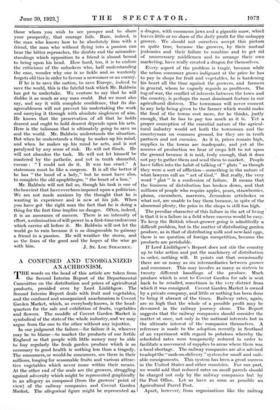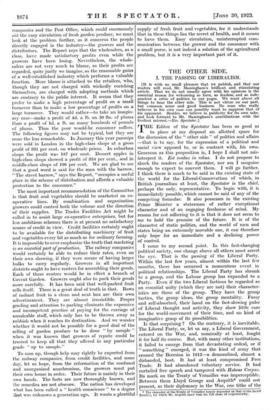A CONFUSED AND UNORGANIZED AN ACHRONISM.
THE words on the head of this article are taken from the Second Interim Report of the Departmental Committee on the distribution and prices of agricultural products, presided over by Lord Linlithgow. The Second Interim Report deals with fruit and vegetables, and the confused and unorganized anachronism is Covent Garden Market, which, as everybody knows, is the head- quarters for the sale and exhibition of fruits, vegetables and flowers. The muddle of Covent Garden Market is symbolical of the state of the whole industry, and we may argue from the one to the other without any injustice.
In our judgment the failure—for failure it is, whoever may be to blame—to market the products of our fertile England so that people with little money may be able to buy regularly the fresh garden produce which is so necessary to good health is nothing less than a tragedy. The consumers, or would-be consumers, are there in their millions, longing for seasonable fruits and various attrac- tive vegetables which never come within their means. At the other end of the scale are the growers, struggling against adversity which might be represented graphically in an allegory as composed (from the growers' point of view) of the railway companies and Covent Garden Market. The allegorical figure might be represented as a dragon, with enormous jaws and a gigantic maw, which leaves little or no share of the daily profit for the unhappy grower. We should not ourselves accept this picture as quite true, because the growers, by their mutual jealousies and their failure to combine and to get rid of unnecessary middlemen and to arrange their own marketing, have really created a dragon for themselves.
Every aspect of the problem is tragic, because while the urban consumer grows indignant at the price he has to pay in shops for fruit and vegetables, he is hardening his heart all the time against the growers, and farmers in general, whom he vaguely regards as profiteers. The tug-of-war, the conflict of interests between the town and the country, is perhaps the most dominant feature in our agricultural distress. The townsman will never consent to any help being given to the farmer which would make the food of the towns cost more, for he thinks, justly enough, that he has to pay too much as it is. Yet a proper conception of the essential nature of the agricul- tural industry would set both the townsman and the countryman on common ground, for they are in truth partners and not enemies. As it is, prices remain high, supplies in the towns are inadequate, and yet at the sources of production we hear of crops left to rot upon the ground because it is said, truly enough, that it does not pay to gather them and send them to market. People have fallen into the habit of talking of " gluts " as though they were a sort of afffiction—something in the nature of what lawyers call an " act of God." But really, the very word " glut " is a confession of failure. It means that the business of distribution has broken down, and that millions of people who require apples, pears, strawberries, plums, cucumbers, marrows, Jerusalem artichokes or what not, are unable to buy them because, in spite of the abnormal plenty, the price in the shops is still too high.
The peculiar character of this failure in the art of living is that it is a failure in a field where success would be easy. To keep the British wheat-grower going is admittedly a difficult problem, but in the matter of distributing garden produce, as in that of distributing milk and new-laid eggs, there is no question of foreign competition, because the products are perishable.
If Lord Linlithgow's Report does not stir the country up to take action and put the machinery of distribution in order, nothing will. It points out that occasionally there are as many as six intermediaries between grower and consumer. This may involve as many as sixteen to twenty different handlings of the produce. Much produce which is sent to Covent Garden for sale is sent back to be retailed, sometimes in the very district from which it was consigned. Covent Garden Market is owned by a private company, and little or nothing has been done to bring it abreast of the times. Railway rates, again, are so high that the whole of a possible profit may be devoured in the railway journey alone. The Report suggests that the railway companies should consider the matter at once, not only in the national interests but in the ultimate interest of the companies themselves. A reference is made to the adoption recently in Scotland of an experiment with regard to potatoes whereby the scheduled, rates were temporarily reduced in order to facilitate a movement of supplies to areas where there was. a local shortage. The railway companies are also advised to adopt the " cash-on-delivery "system for small and suit- able consignments. This system has been a great success in the United States and other countries. For our part, we would add that reduced rates on small parcels should be charged not only by the railway companies but by the Post Office. Let us have as soon as possible an Agricultural Parcel Post.
Apart, however, from organizations like the railway. companies and the Post Office, which could enormously aid the easy circulation of fresh garden produce, we must look at the problem further, as it concerns the people directly engaged in the industry—the growers and the distributors. The Report says that the wholesalers, as a class, have made satisfactory profits even while the growers have been losing. Nevertheless, the whole- salers are not very much to blame, as their profits are regarded, quite justly we imagine, as the reasonable gains of a well-established industry which performs a valuable function. More blame is attached to the retailers, who, though they are not charged with wickedly enriching themselves, are charged with adopting methods which are contrary to the public interest. It seems that they prefer to make a high percentage of profit on a small turnover than to make a low percentage of profits on a large turnover. They .would rather—to take an imagin- ary case—make a profit of 4d. a lb. on 50 tbs. of plums than a profit of id. alb. on many hundreds of pounds of plums. Thus the poor would-be consumer suffers. The following figures may not be typical, but they are none the less remarkable. In January this year parsnips were sold in London in the high-class shops at a gross profit of 331 per cent. on wholesale prices. In suburban shops the profit was 187 per cent. Dessert apples in high-class shops showed a profit of 334 per cent., and in middle-class shops of 196 per cent. We are glad to see that a good word is said for the man with the barrow. "The street barrow," says the Report, "occupies a useful place in the scheme of distribution and affords a valuable protection to the consumer."
The most important recommendation of the Committee is that fruit and vegetables should be marketed on co- operative lines. By combination and organization growers could control both the volume and the direction of their supplies. The Trades Facilities Act might be called in to assist large co-operative enterprises, but for less ambitious schemes there is at present no satisfactory source of credit in view. Credit facilities certainly ought to be available for the distributing machinery of fruit and vegetables every bit as much as for ordinary farming. It is impossible to over-emphasize the truth that marketing is an essential part of production. The railway companies would certainly be able to reduce their rates, even on their own showing, if they were secure of having larger bulks to carry regularly. Growers in all important districts ought to have centres for assembling their goods. Each of these centres would be in effect a branch of Covent Garden. Growers ought also to pack their goods more carefully. It has been said that well-packed fruit sells itself. There is a great deal of truth in that. Rows of radiant fruit in a clean and neat box are their own advertisement. They are almost irresistible. Proper grading and attention to packing eliminate the expensive and incompetent practice of paying for the carriage of unsaleable stuff, which only has to be thrown away as rubbish when it reaches its destination. And we wonder whether it would not be possible for a good deal of the selling of garden produce to be done " by sample " when it was known that growers of repute could be trusted to keep all that they offered in any particular grade " up to sample."
To sum up, though help may rightly be expected from the railway companies, from credit facilities, and some day, let us hope, from the reformation of the confused and unorganized anachronism, the growers must put their own house in order. Their future is mainly in their own hands. The facts are now thoroughly known, and the remedies are not obscure. The nation has developed what has been called a " health conscience " to a degree that was unknown a generation ago. It wants a plentiful supply of fresh fruit and vegetables, for it understands that in these things lies the secret of health, and it means to have them. Easy circulation, uninterrupted com- munication between the grower and the consumer with a small purse, is not indeed a solution of the agricultural problem, but it is a very important part of it.











































 Previous page
Previous page